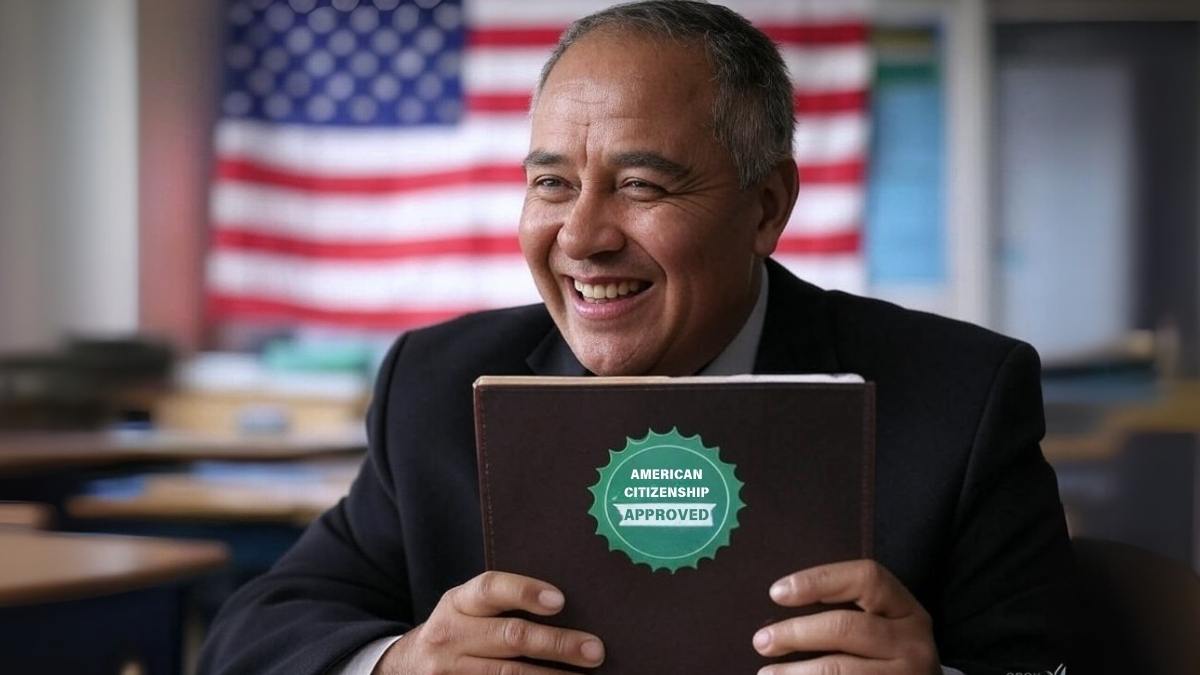The United States Citizenship and Immigration Services (USCIS) provides language exceptions in the citizenship test for certain legal permanent residents.
The USCIS sets specific requirements for naturalization, which include proficiency in the English language and knowledge of civic education. However, there are exceptions in place for certain legal permanent residents. Known as the “50/20” and “55/15” rules, these exceptions allow some applicants to take the test in their native language if they meet particular conditions (USCIS, 2025).
US Citizenship Test: Who Can Skip the English Requirement?
Attaining U.S. citizenship is a process that requires meeting several criteria, such as maintaining permanent residence, mastering the English language, and passing a civic education test. Nonetheless, some permanent residents can benefit from exemptions that simplify the process, particularly regarding the language requirement (USCIS, 2025).
- 50/20 Rule: Applicable for residents who are 50 years old and have lived in the U.S. as a permanent resident for 20 years.
- 55/15 Rule: Pertains to those who are 55 years old and have maintained permanent residency for 15 years.
These exceptions serve to make the journey towards becoming a U.S. citizen more accessible for those who meet the necessary criteria, acknowledging the diverse backgrounds and experiences of applicants.
Exemptions have been thoughtfully crafted to assist individuals who have spent a considerable amount of time living in the country and have reached an advanced age. These individuals are allowed to take the exam in their native language, provided they meet the eligibility criteria set by USCIS. It’s crucial to follow the application process as directed by the agency (USCIS, 2025).
Understanding the “50/20” and “55/15” Exemptions
According to USCIS, the “50/20” exemption is available for those who are 50 years or older and have legally resided in the United States as permanent residents for at least 20 years. Conversely, the “55/15” exemption is designed for individuals who are 55 years or older and have maintained permanent residence in the country for at least 15 years.
Key Points to Remember:
- Applicants under both exemptions can take the civic education exam in their native language.
- An interpreter who is fluent in both English and the applicant’s native language must accompany them to the interview.
Steps to Apply for U.S. Citizenship
For those who are 65 years old or older and have been lawful residents in the United States for a minimum of 20 years, the USCIS offers special consideration during the civics education exam. These individuals are eligible to take a simplified version of the questionnaire, featuring fewer questions about U.S. history and government (USCIS, 2025).
The process of applying for U.S. citizenship requires submitting the N-400 Form, which can be found on the official USCIS website. This form must be filled out with detailed information regarding the applicant’s residency, employment history, and other necessary details to assess eligibility. Additionally, applicants need to provide evidence supporting their duration of residence in the country, such as immigration records and official documents verifying their status as permanent residents.
When it comes to the cost of the process, USCIS has set various fees based on the submission method. Those who choose to file their applications online can conveniently pay the required fee through the government’s electronic system. In contrast, applicants opting for a physical submission need to include their payment with a check or money order. There are also fee reductions available for applicants whose family income is below 400% of the federal poverty threshold, making the naturalization process more accessible.
Special Considerations for Seniors
Individuals aged 65 and older with over 20 years of residency have access to a simplified citizenship questionnaire.
Language Requirements and Exceptions
The requirement to demonstrate knowledge of the English language remains mandatory for most applicants. However, those who meet the criteria for the “50/20” and “55/15” exceptions are exempt from this requirement. Despite the exemption, they must still show an understanding of U.S. history and the government system through the civics test.
The naturalization process involves an important step: an interview with a USCIS officer. During this meeting, the officer reviews the application and verifies the candidate’s eligibility. Applicants need to answer questions about their application, their immigration history, and the fundamental principles of the United States Constitution. In cases where the exam can be taken in another language, a translator must provide an accurate translation to ensure the applicant understands the questions and can provide truthful answers.
Preparing for the Interview
To ensure a fair assessment, USCIS provides official resources to help candidates prepare for the civics test. These include study materials and practice exams. Additionally, various nonprofit organizations and community programs offer support to applicants throughout their naturalization journey.
Key Resources for Applicants:
- Official Study Materials: USCIS offers comprehensive materials to help you understand the content of the civics test.
- Practice Exams: Familiarize yourself with the format and types of questions you may encounter.
- Community Support: Seek assistance from nonprofit organizations and local programs dedicated to helping you succeed in the naturalization process.




